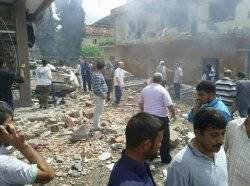Turkey blames Syria-linked groups for blasts
12/05/2013| IslamWeb
Turkey has accused groups supporting the Syrian regime of carrying out two car bombings that killed 43 people and injured 140 others in a border town.
The blast occurred on Saturday in a crowded area of the small town of Reyhanli in the southern Turkish province of Hatay, just a few kilometers from the main border crossing into Syria.
Bulent Arinc, the deputy prime minister of Turkey, said investigators had established links between an intelligence agency of Syrian President Bashar al-Assad and the deadly car bombs.
"We know that the people taking refuge in Hatay have become targets for the Syrian regime," Arinc said in comments broadcast on Turkish television.
"We think of them as the usual suspects when it comes to planning such a horrific attack."
Foreign Minister Ahmet Davutoglu said Turkey reserves the right to take "every kind of measure" after the attacks.
Attacks condemned
UN leader Ban Ki-moon and John Kerry, the US secretary of state, both strongly condemned the bombings.
Kerry said in a written statement that US stood by its ally, Turkey.
"This awful news strikes an especially personal note for all of us given how closely we work in partnership with Turkey, and how many times Turkey's been a vital interlocutor at the center of my work as secretary of state these last three months," Kerry said.
UN spokesman Martin Nesirky said that Ban "condemns all acts of terrorism and reiterates that no cause or grievance ever justifies the targeting of civilians".
A third, smaller explosion caused panic in Reyhanli hours after the twin car bombs struck, but NTV quoted Interior Minister Muammer Guler as saying that it was unrelated and occurred when a car's fuel tank exploded.
The area has been caught up in violence spilling over from the Syrian side in the past few months and the town is home to many of the more than 300,000 refugees who have sought shelter from the uprising against Assad that erupted in Syria in March 2011.
The blasts came as Syrian troops fought rebels in a bid to take back a key supply route linking the center of the country to Aleppo in the north, an activist group said.
"Fierce battles raged pitting troops against rebels. Regime troops fought to reopen the road linking Hama to Aleppo," Rami Abdul Rahman, the director for the London-based Syrian Observatory for Human Rights, told the AFP news agency.
Rebels cut off the road, referred to as the Desert Road, on Thursday. The army had been using it as its main supply route to Aleppo province, large swathes of which are under rebels' control.
Negotiation bid
Meanwhile, Russia said on Saturday there was disagreement over who should represent the opposition in a Syrian peace process.
The revelation came only days after Moscow and the United States announced a joint effort to bring government and rebels to an international conference.
The dispute bodes ill for a civil war in which more than 70,000 people, mostly civilians, have died, according to the UN, and that has left foreign powers looking increasingly helpless.
A senior Kremlin official, who attended talks on Friday between President Vladimir Putin and David Cameron, the British prime minister, said it would be impossible to meet a target of holding the conference by the end of May.
Kerry and Sergei Lavrov, his Russian counterpart, tried to free a two-year diplomatic logjam on Tuesday by saying they would seek to organize a conference, ideally this month.
PHOTO CAPTION
People gather at the site of an explosion in the town of Reyhanli near the Turkish-Syrian border May 11, 2013.
Aljazeera

